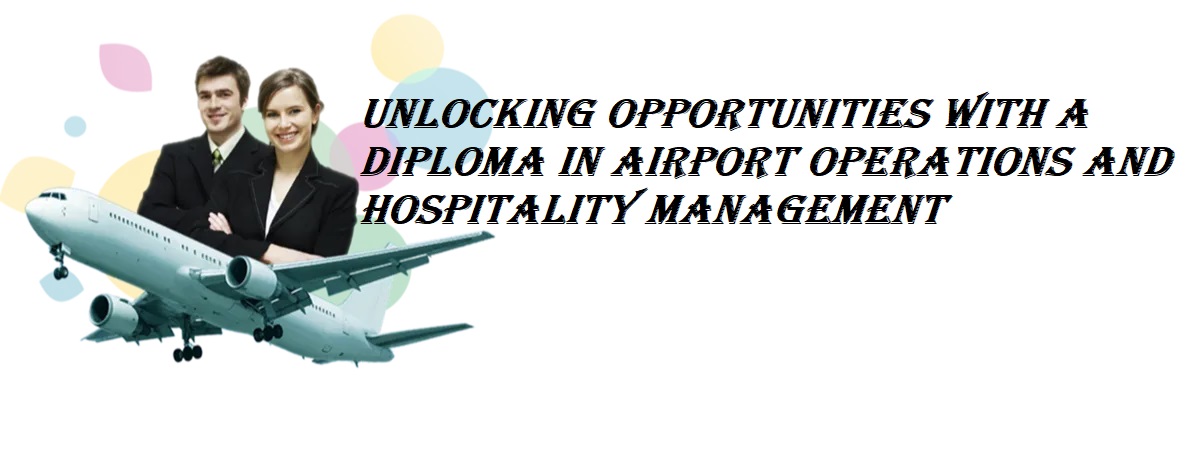In the dynamic and ever-expanding aviation industry, a Diploma in Airport Operations and Hospitality Management opens doors to a promising career. This comprehensive program equips individuals with the necessary skills and knowledge to thrive in the fast-paced world of airport management and customer service. Let’s delve into the key aspects of this diploma, exploring why it’s a strategic choice for those aspiring to excel in aviation.
The Essence of Airport Operations
Smooth airport operations are the backbone of the aviation sector. A diploma in this field provides a deep understanding of the intricacies involved in managing airports efficiently. From ground operations to terminal management, students learn the art of coordinating various processes seamlessly. This includes baggage handling, security procedures, and maintaining communication channels to ensure a smooth flow of air traffic.
Elevating Customer Service through Hospitality Management
Hospitality is at the heart of every successful airport. This diploma places a strong emphasis on honing interpersonal skills and customer service etiquette. Students are trained to handle diverse customer needs, creating a positive and welcoming environment. From assisting passengers at check-in to managing VIP services, the program ensures graduates are well-equipped to exceed customer expectations.
Curriculum Highlights
1. Aviation Industry Overview Understanding the global aviation landscape, students gain insights into industry trends, challenges, and opportunities. This foundational knowledge sets the stage for a successful career in airport operations and hospitality management.
2. Airport Security and Safety Delving into the critical aspects of airport security, the program emphasizes the importance of maintaining a secure and safe environment. Students learn to implement and adhere to international safety standards.
3. Customer Relationship Management Focusing on the customer experience, this module hones skills in effective communication, conflict resolution, and exceeding customer expectations. Graduates emerge as adept professionals capable of managing diverse customer interactions.
4. Internship and Practical Training A key feature of the program is the inclusion of real-world exposure through internships and practical training. This hands-on experience allows students to apply theoretical knowledge in a practical setting, fostering a holistic understanding of the industry.
Career Opportunities
Upon successful completion of the program, graduates can explore a multitude of career paths. These include roles such as Airport Operations Manager, Customer Service Supervisor, or Aviation Security Specialist. The diploma opens doors to employment opportunities with airlines, airports, and related service providers, both domestically and internationally.
Conclusion
In conclusion, a Diploma in Airport Operations and Hospitality Management serves as a gateway to a rewarding career in the aviation industry. The comprehensive curriculum, focused on both operational efficiency and customer satisfaction, ensures that graduates are well-prepared to navigate the challenges of this dynamic field. Embrace the exciting journey towards a fulfilling career by enrolling in this program and unlocking the vast opportunities that await in the world of airport operations and hospitality management.
FAQs:
Q1: What is a Diploma in Airport Operations and Hospitality Management?
A1: A Diploma in Airport Operations and Hospitality Management is a specialized program designed to provide individuals with the skills and knowledge needed for a successful career in the aviation industry. It covers a range of topics including airport operations, customer service, safety regulations, and hospitality management.
Q2: What are the key components of the curriculum?
A2: The curriculum typically includes an overview of the aviation industry, airport security and safety, customer relationship management, and practical training through internships. These components ensure a well-rounded education that prepares students for various roles in airport management.
Q3: What career opportunities does this diploma offer?
A3: Graduates can explore diverse career paths such as Airport Operations Manager, Customer Service Supervisor, or Aviation Security Specialist. Employment opportunities exist with airlines, airports, and related service providers, both domestically and internationally.
Q4: How long does it take to complete the program?
A4: The duration of the program varies, but a Diploma in Airport Operations and Hospitality Management typically takes around 1 to 2 years to complete, depending on the institution and the specific curriculum.
Q5: Is practical training included in the program?
A5: Yes, most programs include practical training elements such as internships to provide hands-on experience. This allows students to apply theoretical knowledge in a real-world setting, enhancing their understanding of the industry.
Q6: What skills will I gain from this diploma?
A6: The program focuses on developing skills in airport operations, customer service, communication, conflict resolution, and adherence to safety standards. Graduates emerge with a well-rounded skill set suitable for various roles in the aviation sector.
Q7: Can I pursue further education after completing this diploma?
A7: Yes, many institutions offer pathways for further education, allowing graduates to pursue advanced degrees or certifications in related fields to enhance their expertise and career prospects.
Q8: Are there specific entry requirements for this program?
A8: Entry requirements may vary by institution, but generally, a high school diploma or equivalent is required. Some programs may also have specific language proficiency or other prerequisites.
